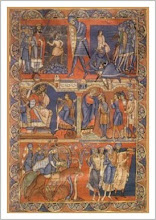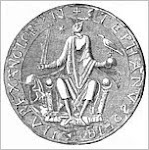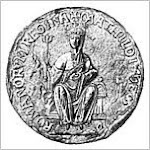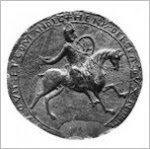• Matilda's Escape and Henry of Anjou
In June 1142 Robert crossed from Wareham to Normandy to discuss matters with Geoffrey of Anjou. However, Geoffrey was still committed to the fight in Normandy and declined to supply the troops and resources Robert sorely needed. Surprisingly though, he did allow Robert to return to England in October with Henry, he and Matilda's eldest son.
In the meantime Stephen had taken advantage of Robert's absence and had, after a rather skilful diversionary tactic, besieged Matilda at Oxford Castle which was held by Robert D'Oyly who was the son of Nigel D'Oyly. He appeared determined not to let her escape this time and pressed the siege relentlessly. However, in a move that has become legendary, Matilda escaped after being lowered by rope from the castle walls at night. With four companions, all of them wrapped in white cloaks to disguise themselves against the snow, she escaped to Wallingford which was held by Brian Fitzcount.
Robert continued the struggle and Stephen slowly to pushed towards Robert's strongholds in Bristol and Gloucester, although the chance of either side gaining overall victory were slim. Matilda lost one of her supporters when Miles of Gloucester was killed in a hunting accident in 1143. At the end of 1145 Robert suffered a major blow when his son Philip changed his allegiance to Stephen. Philip took with him the strategic castles of Cricklade and Cirencester. Robert realised Gloucester and Bristol were under threat and in 1146 he opened negotiations which, given his unsuccessful attack on Farnham in Surrey in 1147, must have proven fruitless. It was when he returned to Bristol to gather new forces that he became ill and died on 31 October 1147.
At this point Matilda appears to have become disheartened and she returned to Anjou and Normandy, leaving the struggle to be taken up by her son Henry. However, unrest would continue throughout the remainder of Stephen's reign.
In 1149 Henry arrived in England with a small force but lacked the resources to change the situation. Oddly, it seems Stephen apparently met with Henry and gave him the necessary aid to return to Normandy after he had been refused assistance by his own supporters.
The last few years of Stephen's reign were dominated by his attempts to have his son Eustace crowned his in own lifetime. The clergy, particularly Theobald of Bec, the Archbishop of Canterbury, had stubbornly refused. He was prepared to recognise Stephen as king but it would seem he had no desire to prolong the civil war which surely would have continued on. In this decision Theobald had Papal backing, so he refused to grant Stephen's request.
• The Anglo-Saxon Chronicle: The Years 1102-1154
20 August 2010
Subscribe to:
Post Comments (Atom)








Do you have a origin of the name Matilda? Who was the first to use the name? Is it Norman-French?
ReplyDeleteI believe the name Matilda is Germanic in origin and was introduced into England by the Normans. Variants of the name include Mathilda and Mathilde. Maud is also sometimes used. It was already being used in Europe prior to the Conquest. During the post-Conquest period of English history there seems to be a plethora of women named or in some cases renamed Matilda e.g. Edith of Scotland.
ReplyDeleteIn the time of King Stephen's reign we're dealing primarily with two Matilda's, i.e. Matilda of Boulogne and Matilda The Empress, styled Lady of the English, hence why I’ve been at pains to try and make it clear which of the Matilda's I’m writing about *chuckles*.
Thank you for stopping by the blog.